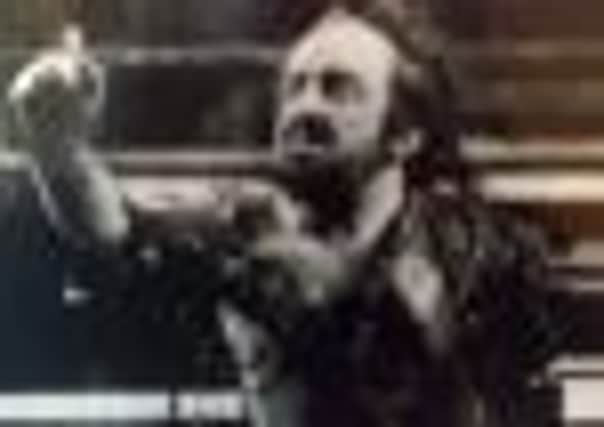Obituary: Derek Hammond-Stroud OBE, baritone


Derek Hammond-Stroud had a deserved reputation in the opera house for his fine singing and his ability to bring an extra dimension to the words he was delivering. His diction was crystal clear and he sang a wide range of roles – from Wagner to Gilbert and Sullivan – with a rare honesty and credibility.
He was principally known for the decade he spent as a principal with English National Opera (ENO, formerly Sadler’s Wells Opera), but he was also a regular visitor to Scottish Opera – he sang the taxing role of the dwarf Alberich in the Ring Cycle with Sadler’s Wells in Scotland in 1972 and in 1969, he was a hilarious Reginald Bunthorne in Patience, the G&S spoof on Oscar Wilde.
Advertisement
Hide AdAdvertisement
Hide AdHammond-Stroud played the “fleshly poet” with a suitable “independent air” in velvet doublet and flowing wig. He cut a wonderfully outrageous appearance from the moment he appeared on stage. He toured Patience throughout Scotland with Sadler’s Wells and Scottish Opera, and John Cox’s fine production was greeted warmly wherever it visited.
Derek Hammond-Stroud was educated in north London and studied singing at London’s Trinity College of Music. He made his professional debut in 1955 at the St Pancras Festival and two years later at the same venue was singing Publius in Mozart’s La Clemenza di Tito. Hammond-Stroud was then offered a contract with the Sadler’s Wells company in 1961. He built up a reputation for bringing out the comedy in such roles as Dr Bartolo in The Barber of Seville and Melitone in Verdi’s The Force of Destiny without ever making the characters far-fetched. He also assumed heavier roles including Rigoletto in the work of the same name, and Papageno in The Magic Flute – many performances were conducted by such young conductors as Alexander Gibson and Colin Davis.
Hammond-Stroud was also offered roles in operetta and displayed a particular flair for such popular G&S “patter” characters as the Lord Chancellor in Iolanthe and Koko in The Mikado. He brought to these a certain restrained pizzazz that much enlivened the productions.
Hammond-Stroud’s connections with Scotland go back to 1960 when he was a member of the Glyndebourne chorus that brought Falstaff to the King’s Theatre with Geraint Evans in the title role. It was a somewhat sad occasion as it was the last visit to the Edinburgh International Festival by the Sussex company.
Hammond-Stroud became a regular guest with Scottish Opera from the late Sixties when he sang Dr Bartolo in The Barber of Seville and appeared in acclaimed productions of La Belle Helene, Patience and Pagliacci. But many will recall his spine-chilling interpretation of Alberich under Alexander Gibson in 1972. He captured the evil and malice of the character with a candid authority and his command of the text greatly enhanced the character’s dramatic impact.
He only made one appearance at the Edinburgh International Festival, in 1974 when he took the demanding role of Speaker in William Walton’s Façade which he repeated at The Proms the following year. Hammond-Stroud was to return often to the Proms – especially for the regular Saturday evenings devoted to Gilbert and Sullivan. His other Proms appearances included Benjamin Britten’s 60th birthday concert in 1973 and roles in Macbeth in 1980 and La Forza del Destino in 1981.
It was the meticulous coaching from the conductor Reginald Goodall that allowed Hammond-Stroud to explore the Wagner repertory. He responded to the fastidious care that Goodall took with all his Wagner productions and this allowed Hammond-Stroud to research his character in great musical and dramatic depth. His thrilling Alberich at ENO and Scottish Opera, and the equally demanding Beckmesser in The Mastersingers of Nuremberg, were pinnacles of his remarkable career.
During the lengthy rehearsals for Beckmesser, Hammond-Stroud realised that the great conductor seemed to closely identify with the complex character of the small-minded town clerk. Goodall insisted that Beckmesser was no comedy cypher and must not be ridiculed. He asked Hammond-Stroud to develop an altogether sadder and more introspective character. Hammond-Stroud’s incisive reading of the controversial character attracted enthusiastic notices from the critics.
Advertisement
Hide AdAdvertisement
Hide AdAnother role he made very much his own was the devious Faninal in Richard Strauss’s Der Rosenkavalier. He first sang it at Covent Garden in 1971 and repeated it in many of the leading opera houses. One particularly starry production was at the Metropolitan in New York when he was joined by Kiri te Kanawa and Kurt Moll (with Luciana Pavarotti in the brief cameo role of the Italian Singer) in 1982.
Hammond-Stroud, who was made an OBE in 1987, was also a keen chess player and student of philosophy. His many discs include the historic live recordings of the Goodall Ring Cycle and numerous classic Gilbert and Sullivan discs and videos.
ALASDAIR STEVEN